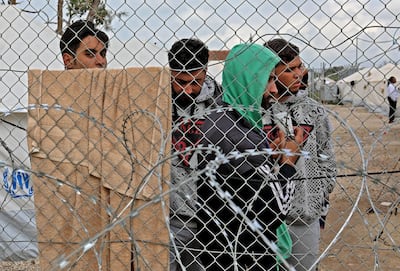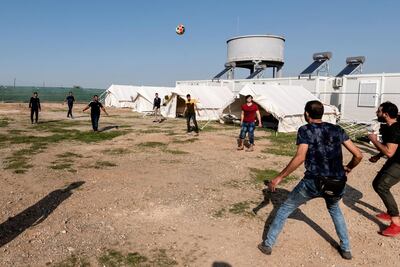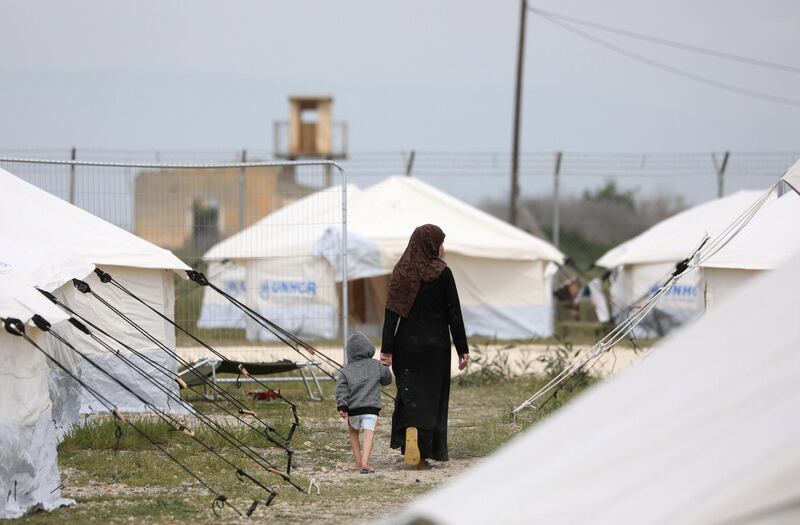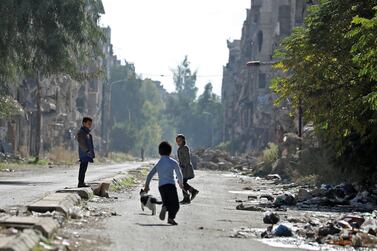Omar Al Shikh was only a year away from being eligible to apply for Cypriot naturalisation when he heard a proposed law would crush his hopes of citizenship for good.
Mr Al Shikh, a journalist, has lived in Cyprus for six years under the status of international protection – one of the 13,210 people registered as such in Cyprus in the last 20 years. The order allows people to reside legally in the country but does not provide fully fledged refugee status. Crucially, holders are eligible to apply for a passport after seven years' residency, something that could soon be stripped away under proposed legislation.
“I thought I was moving towards a future with full legal rights but now it looks like I will be in this temporary status forever,” says Mr Al Shikh.
A new bill put forward by Cypriot interior minister Nico Nouris includes a raft of stricter rules on naturalisation, including language competence, a documented financial history and, most significantly, exclusion of years spent living under international protection from the seven year residency requirement. The barriers for refugees can appear nigh on insurmountable.
“If an asylum protection order is the only legal way for me to reside here, then how can I ever fulfil the criteria to become naturalised? It’s impossible,” says Mr Al Shikh, 32, who lives in Larnaca.
Asylum seekers and those lucky enough to get legal protection are often in the dark about their rights. New arrivals in the country decry the terrible conditions of the cramped Pournara and Kofina migrant camps. The process for recognising asylum is painfully slow, with many people waiting years for appointments.

Elien Dahdal arrived in Cyprus on a tourist visa from Syria with her son, now 15, in 2018 and claimed asylum immediately. It took three years for an interview before she was granted a protection order in summer 2020. "It was incredibly difficult and frustrating, I can't tell you how much I suffered during those years. I wasn't allowed to work and the food coupons and rent subsidy we were given hardly covered our needs. I often felt desperate," Ms Dahdal tells The National.
She recalls how she would wait outside her son’s school gates all day in Damascus after a mortar struck the building next door. For her, every step of the asylum was worth it for her son to be educated in safety. Removing the pathway to citizenship means that once again she worries about what the future holds.
“If this becomes a law, then I need to rethink my future. I left Syria so my son could get a future, not for us to go backwards into fear and insecurity,” says Ms Dahdal, who works in an Arabic restaurant where she cooks Syrian dishes that remind her of home.
Despite having to reapply for his protection order every two years, Mr Al Shikh says he isn’t worried that the government won’t renew it should the war in Syria end. Iraqis in the country still get their status renewed despite the conflict in Iraq being officially over.
The Cyprus interior ministry has made some improvements, granting documentation for international travel. “The good news is that for the first time in six years I can travel," he said. "I have some freedom, which is all I wanted, but I think this is also a way to encourage some of us to move on.”
Migrants, particularly from Syria, have been steadily making their way to Cyprus since 2015, with a peak of more than 13,000 asylum applications in 2019. Among a population of just 800,000 people there are approximately 30,000 asylum seekers – or 4 per cent of the population – making the island the number one asylum-receiving country per capita in Europe.

Cypriot officials are demanding additional international support, but migrants on the island are grateful for the shelter and protection it provides.
“I love Cyprus, I just wish it would act like the rest of Europe and give me a path to citizenship. I deserve to get it and it would change my life. Why should I be denied those rights?” says Ms Dahdal, who dreams of opening her own Syrian restaurant one day.
While she and thousands of others continue to live in a precarious legal limbo, it’s hard to see how they can build a stable future.
Xenophobia or ghettoisation?
Cyprus’s history feeds into the tensions. The small country has been divided since 1974 when Turkey invaded the north in response to a Greece-backed military coup. After being effectively partitioned, around 200,000 Greek and Turkish Cypriots were displaced from the north and south. Indeed, the UN High Commissioner for Refugees first established itself in Cyprus to provide humanitarian aid for displaced people.

“On some level, the Cypriots understand what we are going through and they people have been very kind … it’s a bit like refugees helping refugees,” says Mr Al Shikh, although such sentiments aren’t felt by everyone.
The ongoing dispute between Greece and Turkey has fed negative public perceptions of refugees in Cyprus who, because of their predominantly Arab and Muslim backgrounds, are often considered affiliated to Turkey.
Some asylum seekers in Cyprus, including Mr Al Shikh, arrived overland through the Turkish-backed north, while others arrived on boats run by people-smugglers from Turkey.
Some of these suspicions have been exacerbated by incidents of ghettoisation and crime, as happened in the small coastal village of Chloraka. Tucked away in the islet of Paphos, the inconspicuous village found itself at the centre of a media storm in April 2020, when a group of Syrians murdered a Syrian man. The once-quiet village had been steadily changing over three years when a community of 200 Syrians mushroomed to more than 1,300 – nearly a fifth of the village’s 7,000 residents.
In an unprecedented move, the interior ministry issued a decree in January 2021 banning any more Syrian refugees from settling in Chloraka.
But it was a corruption scandal over the country's Golden Passport programme for the global elite that was the unlikely trigger for the biggest threat to the refugee community. "Ultimately, the country is very protectionist and wants to make a clear distinction between the rights of Cypriots and the rest," says Mr Al Shikh.








